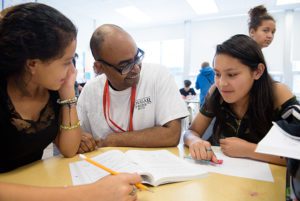 As the academic year draws to a close, the arrival of summer offers us the opportunity to breathe and reflect. It has been a year filled with unprecedented hardships for school communities nationwide, leaving educators, administrators, and leaders feeling drained and exhausted. However, amidst the challenges, we have begun to see the impact of courageous leaders earnestly listening to students. Here are just a few stories that exemplify the power of centering students’ voices.
As the academic year draws to a close, the arrival of summer offers us the opportunity to breathe and reflect. It has been a year filled with unprecedented hardships for school communities nationwide, leaving educators, administrators, and leaders feeling drained and exhausted. However, amidst the challenges, we have begun to see the impact of courageous leaders earnestly listening to students. Here are just a few stories that exemplify the power of centering students’ voices.
In April I joined the closing Leading Equitable Schools institute where I asked Seattle assistant principals to share how connecting with students is impacting their practice. Across the room, I heard stories about how these school leaders are creating visions for their schools based on what they’ve learned from students. One assistant principal shared that while drafting a mental health grant for the school, she talked with students about how they thought the funds should be allocated. Capturing that invaluable feedback from her students helped ensure that what was requested in the grant was what the students felt they really needed. – Max Silverman, Executive Director, CEL
While recently facilitating a Leading Equitable Schools small group session in Nooksack Valley, our group of school and district leaders observed a lesson where a cohort of 25 Latinx middle school students discussed their feelings of agency and belonging at school. Through the lesson, school administrators and district leaders learned more about the impact of this newly created cohort of multilingual learners. The students reported that before joining the cohort they felt “quiet” and “lost”, but as part of the cohort, they talked about “feeling supported” and “free.” One eighth-grade student shared: “I don’t know all of English, but I try. This is who I am. I speak Spanish. Me gusta mi cultura y nunca la cambiaría por nada.” –Joanna Michelson, Senior Director, CEL
During a recent Leading for Teacher Professional Learning session, one teacher leader from Roseburg Public Schools shared how exploring the connection between equity and how students experience instruction has impacted her practice. This third-grade teacher now elevates her “invisible students”– those who are quieter and often overlooked, who are neither high performing nor have academic interventions– by celebrating them when they positively contribute in class, fostering meaningful moments for them with adults on campus, and asking the students questions rather than making assumptions. She said, “I know that what we’ve worked on for the last two years will stay with me throughout my entire teaching career.” –Jenn McDermott, Director of Innovative Initiatives

